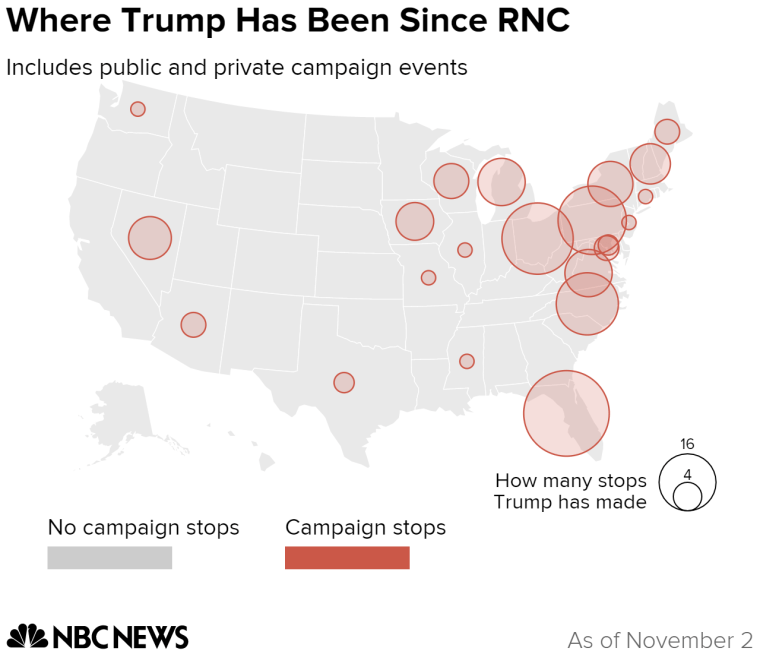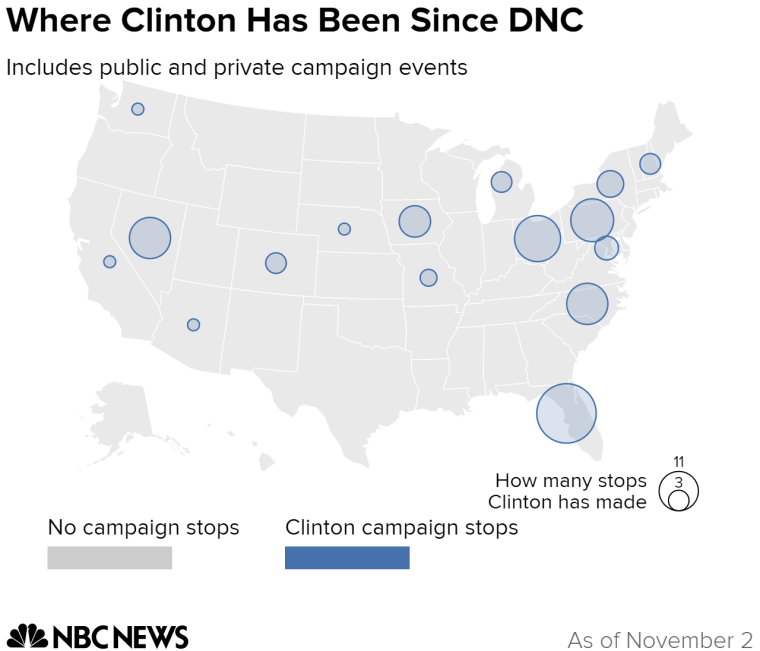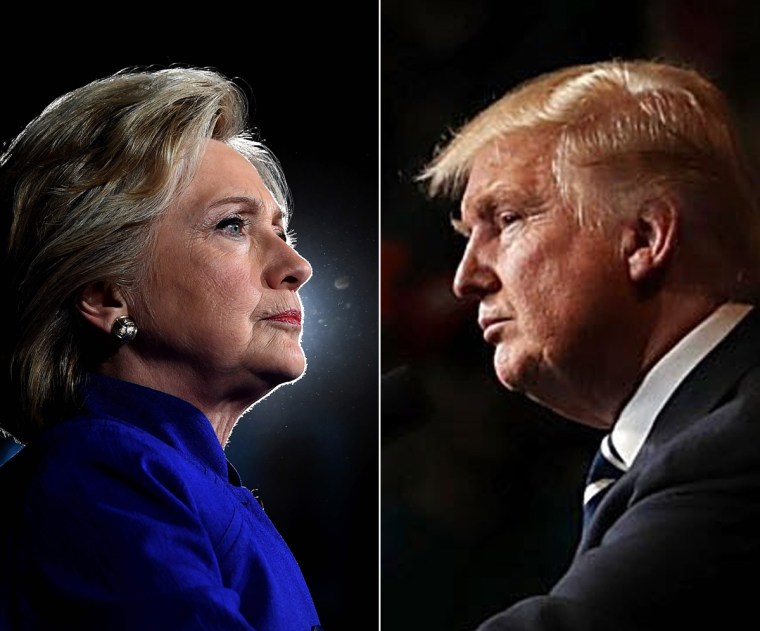Hillary Clinton and Donald Trump have largely ditched the traditional optimistic tone typical of the end of a presidential campaign and instead are making their closing pitches by arguing that the other is either too dangerous or untrustworthy.
Fueled by their historically high unfavorable ratings, the candidates are fighting to remind voters of the opponents' faults and shortcomings, hoping to energize their own supporters and sway any remaining undecided voters.
Clinton's campaign has been deploying a small army of popular surrogates — notably President Barack Obama, first lady Michelle Obama and Vice President Joe Biden — in battleground states to remind voters of Trump's controversies and to make the case that he is unfit and too irrational to serve.
In Tempe, Arizona, Wednesday, Clinton asked voters "to just think for a few minutes."
"Imagine he is taking the oath of office," Clinton said. "Imagine having a president who demeans women, mocks the disabled, insults Latinos, African-Americans, Muslims, POWs, who pits people against each other instead of pulling us together — someone with a very thin skin who lashes out at anyone who challenges him."
Related: Polls: Trump Ahead in Texas and Arizona, Deadlocked in Georgia
President Obama in Miami Thursday delivered the same message: "Anybody who suggests that America should torture people or ban entire religions from entering America or insults POWs or attacks a Gold Star mom ... or talks down about our troops, that's not somebody who's fit to be president."
"Anyone you can bait with a tweet is not someone you can trust with nuclear weapons," Obama added.
PHOTOS: Cheers, Jeers, and Tears as Election Day Nears
While policy is speckled through out her speeches, Clinton is ending her campaign with an emotional gut check. And her multi-million dollar campaign ad buys funded with the $153 million she had on hand as of Oct. 19 reinforce that theme. Behind images of melancholy children, veterans and women is Trump's own voice, saying, "Military is a disaster. They're bringing drugs; they're rapists. Putting a wife to work is a very dangerous thing."
Finally the words appear: "We are not him."
For his part, Trump's mantra has lately included self-reminders to do no harm and to "stay on point, Donald, stay on point."
As polls are tightening in battleground states, giving Trump a last-minute jolt of enthusiasm and hope, the candidate is taking his own, or his aides', advice. Not since Oct. 22 when Trump lashed at his accusers, saying he was going to sue the women who alleged that he sexually assaulted them, has he made an unforced error on the stump.
But while he has avoided ad-libbed asides, the GOP nominee is still dishing out the red meat attacks on "Crooked Hillary," mentioning at every chance the latest FBI inquiry into the emails of her aide Huma Abedin.
This week, Trump has leveled charges that Clinton was on the verge of being indicted (she isn't), and that Clinton committed perjury (which he didn't offer any evidence to support). Despite being false, Trump repeated the claims on the campaign trail to enthusiastic applause.
Trump campaign manager Kellyanne Conway expressed optimism that polls are closing nationwide and that Trump could win the key states of Pennsylvania and Colorado.
Related: Feds to Monitor Voting in Four N.C. Counties
"It's not a big mystery," Conway said on MSNBC's "Morning Joe" Thursday. "It's where we invest our two greatest assets, Gov. Pence and Mr. Trump, and where we're putting our ads on TV."
"I think we've got [Clinton] on the run. They'r sort of following our lead," Conway added, saying later on CNN that Trump is gaining momentum because he is "closing with a positive message."
With an apparent infusion of cash, Trump has released four new ads for his final pitch. Of the four, one is positive. The ad, called "United," focuses subtly on women with the narrator optimistically saying, "We can change directions and Make America Great Again."
Trump gave his campaign $10 million last week and his campaign announced that it raised $100 million in October from "small dollar donors." The amount can't be verified until the next financial filings are released after Election Day, but it would be a major injection of much needed money for a campaign that had almost one-third less cash on hand than Clinton's campaign.
A $100 million fundraising month would be impressive because, through Oct. 19, the campaign raised just over $34 million in small dollars, meaning it would have had to raise $64 million in the final 12 days of the month.
Where the campaign stops in the final four days before Tuesday is the biggest indicator as to where the candidates think they need to defend or make up ground in the race.
Clinton's and Trump's schedules are similar, even visiting the same states on the same day. Both were in North Carolina on Thursday and will be in Ohio and Pennsylvania on Friday. These three states — and Florida — have been the most visited by both campaigns. Trump must win those four states to have any chance to win the necessary 270 electoral votes to become president. If Clinton can stop him there, the rest of the map for her is achievable.

And of those four states, Pennsylvania is the most critical. Clinton will visit the state Friday and Saturday and have a final rally in Philadelphia with Obama on the eve of Election Day. Trump will also be there at least twice between Friday and Election Day, and he has sent his surrogates, namely his family, there more than any other state in the past month.

Even as polls show Clinton leading in Pennsylvania and state party representatives admit Trump still has a tough hill to climb there, he is doing well in rural, white, working class parts of the state. Pennsylvania doesn't have easy access to early voting, another reason to propel the candidates there in the last few days. It is one of two battleground states where the vast majority of ballots haven't been cast yet and won't be until Tuesday.
While polls show a tightening in North Carolina, early voter returns should give Clinton some hope as 43 percent of ballots turned in are from Democrats compared to 32 percent from Republicans, according to TargetSmart's modeling.
Related: NBC News' Battleground Map
Florida, however, appears to be neck and neck. Polling consistently shows the race well within the margin of error and the same percentage of Republicans and Democrats — 40 percent — have voted early.
Both candidates hope that their closing arguments help to seal the deal with voters — or at least convince them not to vote for the other one.

